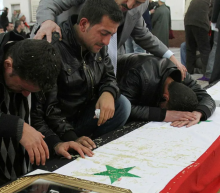A study by University of Washington Sociologist Nathalie Willliams, and Diego Alborz-Gutierrez, Enrique Acosta, and Emilio Zaghani from the Max Planck Institute for Demographic Research, was recently highlighted in “New research quantifies bereavement over time and shines a spotlight on its lasting impact”, a news article published in Haaretz, an Israeli newspaper.
The study, “The long-lasting effect of armed conflicts death on the living: quantifying family bereavement”, was originally published in the journal Science Advances. Research was based on demographic analyses of existing databases, focuses on an innovative approach to measuring bereavement rates following the death of a parent or a child in the population of four regions of the world (Syria, the West Bank and Gaza Strip, Afghanistan, and Ukraine), places where death rates in war events were highest in 2014-23. Using demographic projections, the researchers show that these populations will continue to experience considerable levels of bereavement in decades that follow.
This finding underscores that bereavement is a profound, yet understudied consequence of conflict with potentially far-reaching implications lingering long after the conflict ends.
